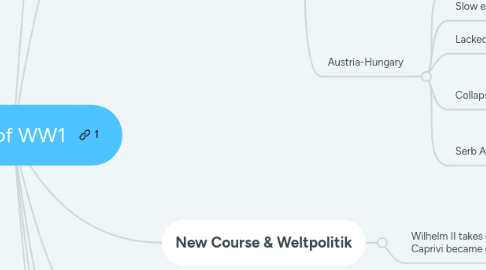
1. Franco-Prussian War
1.1. Occupation of Paris by Prussia (soon to be Germany)
1.1.1. Prussians control and humiliate France
1.1.1.1. Desire for revenge and the "revanche" movement within France
2. Great Powers
2.1. Germany
2.1.1. Growing middle and working class
2.1.1.1. Socio-Economic Tension
2.1.1.1.1. Junkers promote allegiance to Kaiser and militarism, which leads to a desire for more world territories
2.2. France
2.2.1. Wealthy democratic republic
2.2.1.1. Agricultural economy
2.2.1.2. Heavy gold reserves
2.2.1.2.1. Foreign investment
2.2.2. Political instability and short lived governments promoting revanchist policies or pacifist ideals
2.2.2.1. Shifting foreign policy
2.2.2.1.1. Desire to "contain" Germany
2.3. Britain
2.3.1. Working class discontent
2.3.2. Fading powers entering 20th century
2.3.2.1. Dependence on Navy
2.3.2.1.1. Stretched resources
2.3.3. Democracy
2.3.4. Rivalry with France and Russia
2.4. Turkey
2.4.1. Corrupt and ailing country
2.4.1.1. Many revolts
2.4.1.2. Weak on the global stage
2.4.1.2.1. Exploited
2.5. Russia
2.5.1. "Divine" Monarchy
2.5.2. Ineffective government and state
2.5.2.1. Discontent in middle classes
2.5.2.2. Several losing war efforts
2.5.2.2.1. Loss of Status as global power
2.5.3. Wished to help ottomans and encouraged slavic independence
2.6. Austria-Hungary
2.6.1. Lacked cohesion
2.6.2. Slow economic growth
2.6.3. Lacked strength
2.6.3.1. Desire for power
2.6.4. Collapsing ottoman empire
2.6.4.1. Power gap
2.6.4.2. Slavic thoughts of independence and rebellion within Austro-Hungary
2.6.5. Serb Agression
3. New Course & Weltpolitik
3.1. Wilhelm II takes control and Leo Von Caprivi became chancellor
3.1.1. Dissolving of treaties
3.1.1.1. Alliance between Russia and France
3.1.1.1.1. Strong anti-german policies
3.1.1.2. Bismarck system of foreign policy destroyed
3.1.2. Germans seek to establish global power and divert from issues on home soil
3.1.2.1. This policy became known as Weltpolitik
4. Imperialism
4.1. Colonial Rivalries
4.1.1. Britain established new alliances with France, Russia, and Japan in the far east to remain strong
4.1.1.1. Europe was split into the Triple alliance and Triple entente
4.2. German's want power
4.2.1. Germans congratulates Boer republic on resisting Britain
4.2.1.1. Rising tensions
4.2.1.2. British outrage
5. Pre-Fascist Italy
5.1. National identity is lacking in the late 1800s, Italy is a largely disorganized state full of small villages .
5.1.1. National Socialist party is formed in 1892
5.1.1.1. Most of Italy was controlled by few elites pre 1900, precipitating the start of trade unions
5.1.1.1.1. Politicized Italy becomes divided at the beginning of the war as people begin to take interest in national politics.
6. Alliance System
6.1. Germans wish to establish naval dominance
6.1.1. British wish to retain power
7. The Balkan situations
7.1. Turkey,
7.1.1. Used to rule Balkans but now is irrelevant
7.2. Austria-Hungary
7.2.1. Losing grip on
7.2.2. Southern Slavs wished to separate and join Serbia
7.2.2.1. Austro-Hungarian and Serbia tensions rise
7.3. Russia
7.3.1. Wished to help Serbia
7.3.2. Wished to benefit from declining turkish power
7.3.3. Balkans were strategically important
